In an increasingly interconnected world, the importance of certified translation cannot be overstated, especially when dealing with official paperwork across borders. Whether you’re applying for immigration, submitting court documents, or enrolling in an international academic institution, having accurate and legally compliant translations is essential.
The legal document translation importance lies in ensuring that your translated documents meet regulatory standards, are accepted by authorities, and avoid unnecessary delays or rejections. From visa applications to property deeds, translation errors can lead to complications, highlighting the benefits of working with professional services that specialise in accuracy and compliance.
Today, online translation platforms make accessing certified professionals more convenient than ever. However, knowing when to choose certified over standard translation is key to avoiding costly mistakes and ensuring your documents are not rejected.
In this guide, we break down everything you need to know about accredited translations, what they are, when they’re required, and why they matter.
What Makes a Translation “Certified”?
A certified translation is an official translation of a document that includes a signed statement from the translator or translation company affirming the translation’s accuracy and completeness in relation to the original text.
Official vs Notarized vs Accredited Translation Difference:
| Type | Who Certifies | Extra Requirements | Commonly Used For |
|---|---|---|---|
| Certified | Translator/Agency | Signed statement | Immigration, legal, academic |
| Notarized | Translator + Notary Public | Notary stamps/signs | Court, government, contracts |
| Official | Registered translator/agency | Credentials on the document | Some countries, academic, and legal |
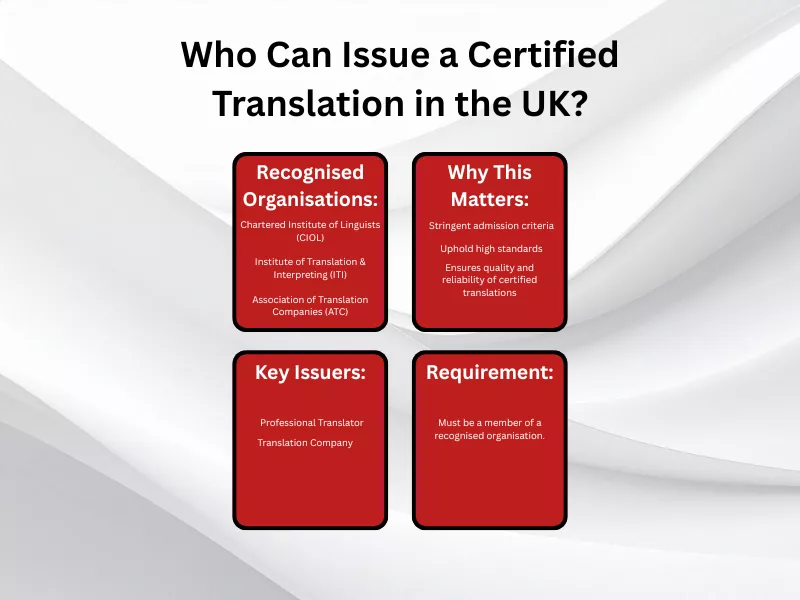
An authorised translation in the UK can be issued by a professional translator ortranslation agency UK that is a member of a recognised organisation, such as the Chartered Institute of Linguists (CIOL), Institute of Translation & Interpreting (ITI), or the Association of Translation Companies (ATC). These organisations have stringent admission criteria and uphold high standards for their members, ensuring the quality and reliability of legally recognised Translation.
Which Documents Usually Need to Be Translated by a Certified Translator?
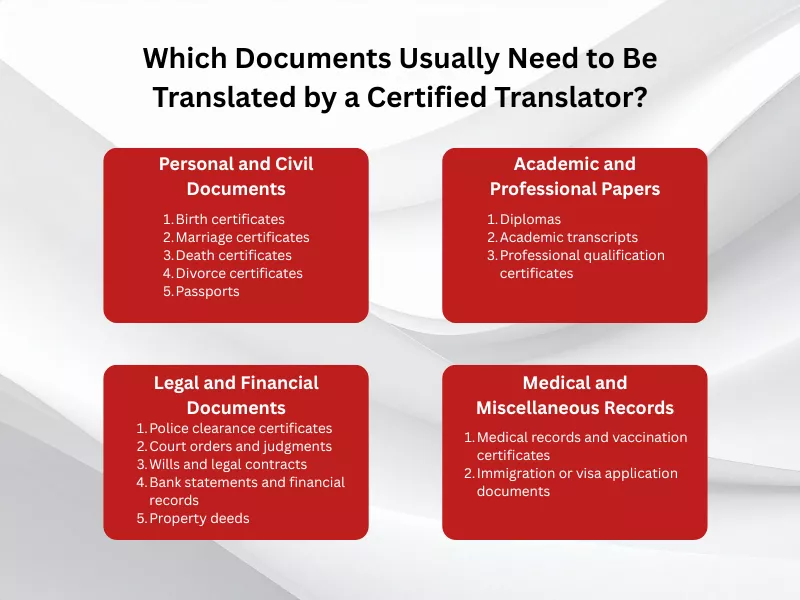
Certified vs. Professional Translations in UK with certification includes personal, legal, and official papers that are not initially in English or Welsh and are required for submission to UK authorities, academic institutions, or legal bodies.
Personal and Civil Documents
- Birth certificates
- Marriage certificates
- Death certificates
- Divorce certificates
- Passports
Academic and Professional Papers
- Diplomas
- Academic transcripts
- Professional qualification certificates
Legal and Financial Documents
- Police clearance certificates
- Court orders and judgments
- Wills and legal contracts
- Bank statements and financial records
- Property deeds
- Certified Contract Translation.
Medical and Miscellaneous Records
- Medical records and vaccination certificates
- Immigration or visa application documents
What Are Accredited Translation Services?
Certified translation services are professional services that provide officially recognised translations of documents. A signed statement accompanies these translations, sometimes called a certificate of accuracy, attesting to the translation’s truthfulness, completeness, and conformity to the original.
In the UK, these services are used for documents required by government agencies, courts, universities, and employers for legal, academic, or regulatory purposes.
Why Accredited Translations Are Important?
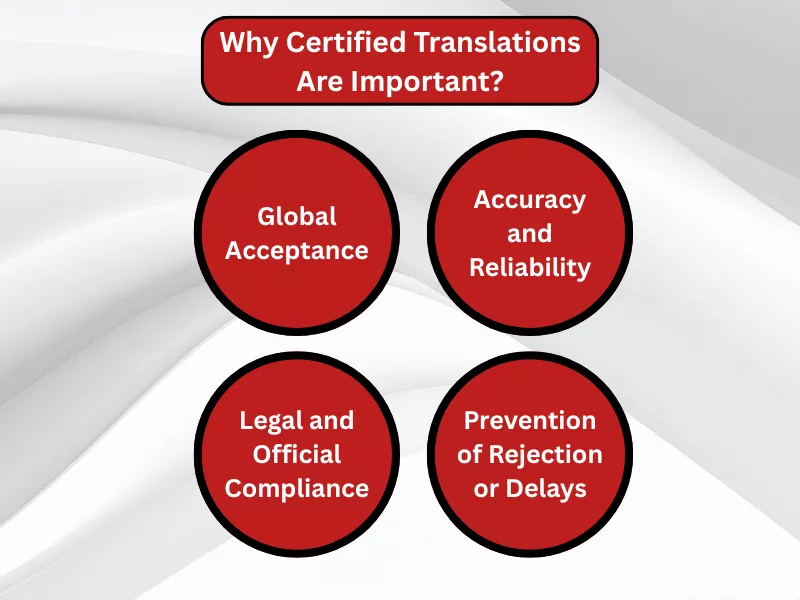
Global Acceptance:
Certified document translations are accepted globally and recognised internationally, thereby helping in cross-border legal, business, and personal matters smoothly and securely.
Accuracy and Reliability:
Accuracy in official document translation is paramount. Certified translators maintain the accuracy of the translation and ensure that it matches the original document. These translations are typically accepted by all authorities and government departments, and also prevent costly misunderstandings or legal disputes.
Legal and Official Compliance:
Most official processes, such as visa, immigration, and college enrollment, have strict certified translation requirements UK, ensuring legal and official compliance. avigating these requirements often leads to the specific question of certified vs notarised translation for international use.
When you submit or provide accredited translations to the UK authorities, you can rest assured that your translations meet regulatory standards and can be trusted.
Prevention of Rejection or Delays:
Submitting translations without the certified translation stamp often leads to rejection of applications or legal challenges, causing delays and financial costs. The role of certified translators is significant here as it helps to avoid these problems by providing verified, trustworthy documents.
Overall, certified translations serve as a critical bridge that removes language barriers in official and legal contexts, ensuring seamless communication and compliance with regulations.
Benefits of Authorised Translation Provider in the UK
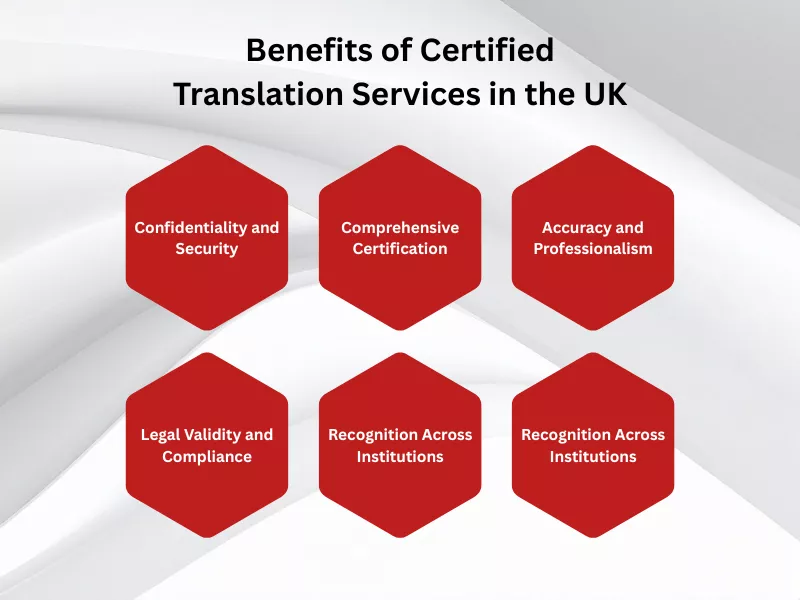
Confidentiality and Security:
Misplacing documents can cause significant distress and problems. Since these are sensitive documents, a certified translator or translation agency maintains confidentiality and data protection standards, ensuring client privacy.
Comprehensive Certification:
Professional certified translations come accompanied by a signed certificate of accuracy or an affidavit that guarantees the authenticity and completeness of the translation. This added authority and reliability, helping you avoid potential rejections.
Accuracy and Professionalism:
Professional translation services are aware of the certified translation format and offer accredited translations for visa and legal documents, ensuring accuracy and precision. They do not just translate documents but also maintain cultural nuances, meanings, and intent to reduce the risk of errors that could invalidate documents. Furthermore, they have a rigorous quality assurance process to maintain high standards of quality in the translated document.
Legal Validity and Compliance:
UK government agencies, courts, universities, and other official bodies require certified translations for legal and important documents. Reliable and accurate translations by certified translators ensure authorities accept all translations without hassle.
Recognition Across Institutions:
Whether you need certified translation for immigration or study abroad, these translations come with an affidavit attesting to the accuracy, ensuring international recognition. High-quality certified translations of personal documents provide peace of mind, guaranteeing easy acceptance across all authorities and worldwide.
Avoidance of Delays and Rejections:
Using certified translations means documents are accurately translated, preventing delays, costly resubmissions, or legal complications often caused by uncertified or poor-quality translations.
When Do You Need Legally Recognised Translation?
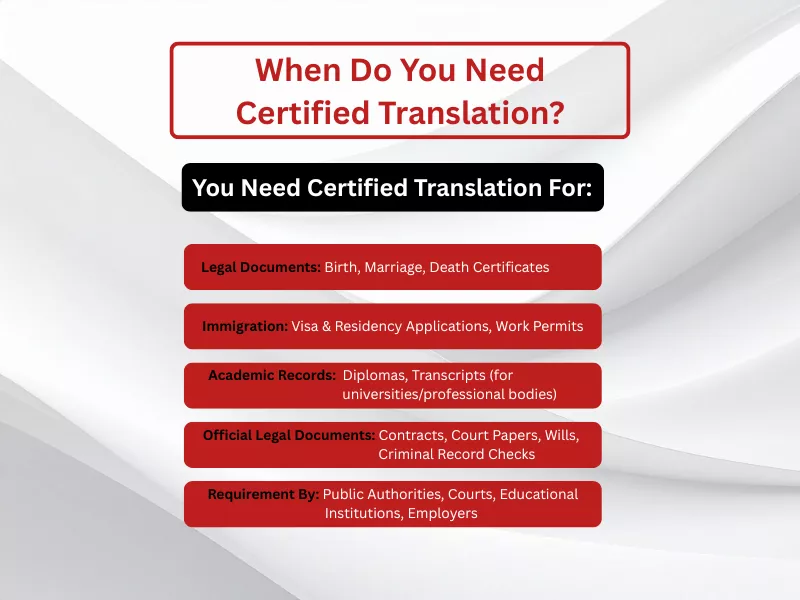
Investing in legally recognised translation is mandatory when:
- Submit birth, marriage, or death certificates for legal or administrative purposes.
- For immigration and visa applications, including work permits and residency documentation.
- When providing academic records such as diplomas and transcripts to universities or professional bodies, ensure they are accurate and complete.
- For legal documents like contracts, court papers, wills, and certificates of no criminal conviction.
- When required by public authorities, courts, educational institutions, or employers.
- When legal documents are involved, accuracy is non-negotiable. Knowing how to choose a translation company with the right credentials is the first step in protecting your interests.
What Is the Difference between Certified and Standard Translation?
Certified translations are essential when official authenticity and legal validation are necessary, ensuring that authorities accept documents without dispute. Conversely, standard translations serve well for everyday use when formal validation is not required.
| Main Concern | Professional Service | Amateur Translator |
|---|---|---|
| Risk and Liability | Assumes professional liability for high-quality legal translation work, often backed by Errors & Omissions (E&O) insurance to cover potential damages. | Offers no professional accountability; all financial and legal risk of translation errors falls directly on the client. |
| Confidentiality | Bound by formal Non-Disclosure Agreements (NDAs) and uses secure, encrypted platforms for document handling. | May use unsecured channels (e.g., personal email), posing a significant risk to client confidentiality and data security. |
| Project Scalability | Equipped to handle large, complex projects with tight deadlines through dedicated project managers and teams of vetted linguists. | Acts as a single point of failure; lacks the capacity and infrastructure to manage high-volume or urgent requests consistently. |
| Post-Delivery Support | Provides ongoing support and clarification for translated documents as part of their service commitment. | Typically offers no support after delivery, leaving the client without recourse for future questions. |
| Regulatory Compliance | Experienced multilingual legal document services are often compliant with data privacy regulations like GDPR. | Generally unaware of or not compliant with international data protection and privacy regulations. |
| Cost vs. Value | Higher initial investment that provides long-term value by minimising risk and ensuring legal validity. | Lower upfront cost that can lead to higher long-term expenses from fixing errors, disputes, and legal challenges. |
Common Mistakes in Document Translation that Require Certification
| Common Mistake | Description | Why Validated Translation Helps |
|---|---|---|
| Literal Translation of Legal Terms | Translating legal jargon word-for-word without considering legal context and nuance, leading to errors in meaning. | Certified translators understand legal terminology and context to provide accurate, meaningful translations. |
| Missing Format Elements | Omitting the original document’s layout, seals, stamps, or signatures during translation affects legal validity. | Certified translations strictly follow original formatting and certification rules to ensure acceptability. |
| Using Unqualified Translators | Relying on bilingual friends, general translators, or machine translation, which lack legal/technical expertise. | Certified professionals have legal and linguistic expertise, ensuring precision and compliance. |
| Omitting or Altering Information | Leaving out text, stamps, or signatures, or altering content, can invalidate documents. | Certified translation requires complete and faithful reproduction of all document content, including errors. |
| Lack of Quality Control | Skipping proofreading and verification stages can lead to typos or factual errors with serious consequences. | Certified services include quality assurance and review processes to ensure error-free translations. |
| Incorrect Names and Numbers | Errors in personal names, dates, serial numbers, and amounts leading to legal or administrative problems. | Certified translators pay close attention to detail to prevent such mistakes. |
| Non-compliance with Certification | Failing to provide the required signed statement, certification, or translator details results in rejection. | Certified translations include all necessary certification elements recognised by authorities. |
Things to Consider before Choosing the Right Government-accepted Translation

Before choosing the right accredited translation service in the UK, consider these important factors:
Translator Qualifications and Membership:
Ensure the translator or agency is a member of renowned professional bodies such as the Institute of Translation & Interpreting (ITI), Chartered Institute of Linguists (CIOL), or Association of Translation Companies (ATC), which guarantee professional standards and expertise.
How to Verify a Certified Translator?
Check Professional Membership:
Confirm the translator or agency is registered with recognised bodies such as the Chartered Institute of Linguists (CIOL), Institute of Translation and Interpreting (ITI), or the Association of Translation Companies (ATC). These organisations maintain public directories of accredited translators and agencies.
Review Certification Statement:
Ensure the translation includes a signed certification statement declaring the translation is a true and accurate representation of the original, along with the translator’s name, signature, date, and contact details.
Evaluate Experience and Expertise:
Verify the translator’s experience with the relevant document type (legal, academic, medical, etc.), as specialised knowledge is critical for accuracy and acceptance.
Look up Client Reviews and Reputation:
Check reviews, testimonials, and ratings from previous clients to assess reliability and quality of service.
Confirm Compliance with Privacy and Security:
Ensure the translator or agency follows confidentiality protocols and complies with data protection regulations when handling sensitive documents.
Consult Public Registers:
Use online directories provided by professional bodies like ITI and CIOL, which list certified translators and allow direct verification.
Alternatively, you can search for a legal translation service provider offering official translation services, so you can rest assured that the translator possesses all necessary qualities.
Experience and Specialisation:
Look for translators with experience relevant to the specific type of document (legal, academic, technical) to ensure accurate terminology and understanding of the subject matter. Furthermore, check if they cater to multiple language services.
Certification and Compliance:
Verify that the service provides the required certification statement, including a signed declaration of accuracy, translator credentials, date, and contact information, as per UK Home Office and official requirements.
Quality Assurance Processes:
Choose providers with stringent quality control measures such as proofreading, editing, and review processes to minimise translation errors and omissions.
Transparency and Pricing:
Clearly understand the pricing structure, including costs for certification, to avoid hidden fees. Prioritise value and reputation over low-cost offers. Tranlsaiton.co.uk offers clear Translation service rates in the UK.
Confidentiality and Data Security:
Make sure the translation service commits to protecting sensitive client information and complies with data privacy regulations.
Customer Support and Communication:
Prioritise services that offer responsive communication and can clarify any doubts throughout the translation process.
Reputation and Reviews:
Check for positive client reviews, testimonials, and references to gauge reliability and client satisfaction.
Taking these factors into account will help ensure the selection of a trustworthy, professional certified translation service that meets legal and official standards in the UK, reducing risks of delays or document rejection.
Conclusion: Importance of Certified Translation for Official Documents
Understanding certified translations may seem challenging; however, all you need to know about certified language translation is that they come with a translation affidavit, a signed statement attesting to the translation, and a certified translation stamp, required for legal and authoritative acceptance. Translators who specialise in certified translation are familiar with the formal certified translation system, helping you avoid costly errors, misunderstandings, and rejection.
Frequently Asked Questions
What Happens If You Submit a Non-certified Translation?
Submitting a non-certified translation—especially for court documents or other official use—can lead to rejection or delays. Official authorities often require certified translation to meet legal requirements and ensure authenticity. If the translation must be accepted for immigration, legal, or academic purposes, submitting a standard or non-certified version could result in your documents being rejected, causing setbacks. This underscores the importance of working with professionals who provide certified translation.
Why Do Official Authorities Require Certified Translations?
When it comes to certified translations, accuracy and traceability are crucial. Certified translation refers to the process where the translator affirms that the translation is complete and accurate, typically with a signed statement. This meets official requirements from governments, courts, and institutions that demand certified translations to ensure every translation is reliable and legally valid. Court documents, immigration applications, and educational transcripts often require certified translation to maintain procedural integrity.
What Is the Importance of Accuracy in Certified Translation?
In the world of certified translation, accuracy isn’t optional—it’s essential. Whether you’re dealing with court documents, immigration papers, or academic transcripts, one small error can result in legal complications or rejection. The need for accurate and reliable translation grows as global interactions increase, and certified translations play a critical role in ensuring trust. That’s why translation services offer strict quality control and review processes to guarantee that your documents are accepted the first time.
How Does a Certified Translation Ensure Accuracy and Trust?
Professionals with deep subject knowledge and a keen eye for detail typically complete certified translations. They include signed statements verifying the translation’s accuracy, which helps institutions accept translations from your chosen provider with confidence. This added layer of accountability means that every translation is traceable and verifiable, especially important for court documents and government forms. Certified translators provide legible copies of your documents, formatted to match the original, maintaining consistency and professionalism.
When Should Individuals or Businesses Use Certified Translations?
You will need a certified translation when dealing with anything that has legal requirements or official requirements—such as immigration, visa applications, academic admissions, or court documents. Businesses may also need them for international contracts, patents, or regulatory submissions. As the demand for translation services in the UK continues to grow, it’s crucial to know when you’ll need certified translation to avoid delays and rejections. Whether you’re navigating global markets or handling personal legal matters, certified translations play a vital service role in ensuring your documents must meet international standards.
- Difference between Certified vs Notarised Translation: A UK Guide - 12th February 2026
- How to Choose a Translation Company: 5 Key Factors to Consider - 28th January 2026
- 5 Top Reasons to Use Certified Contract Translation - 21st January 2026












